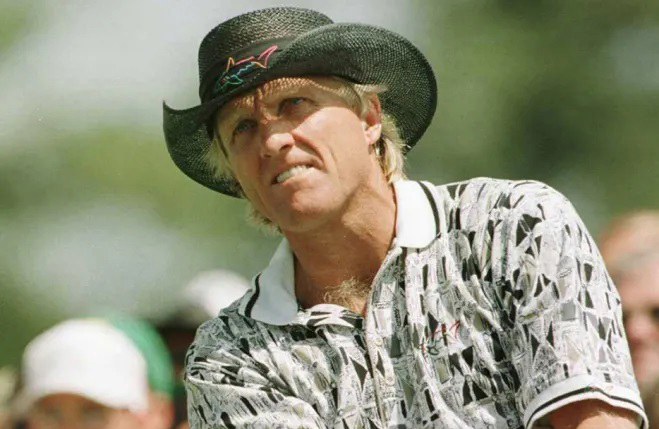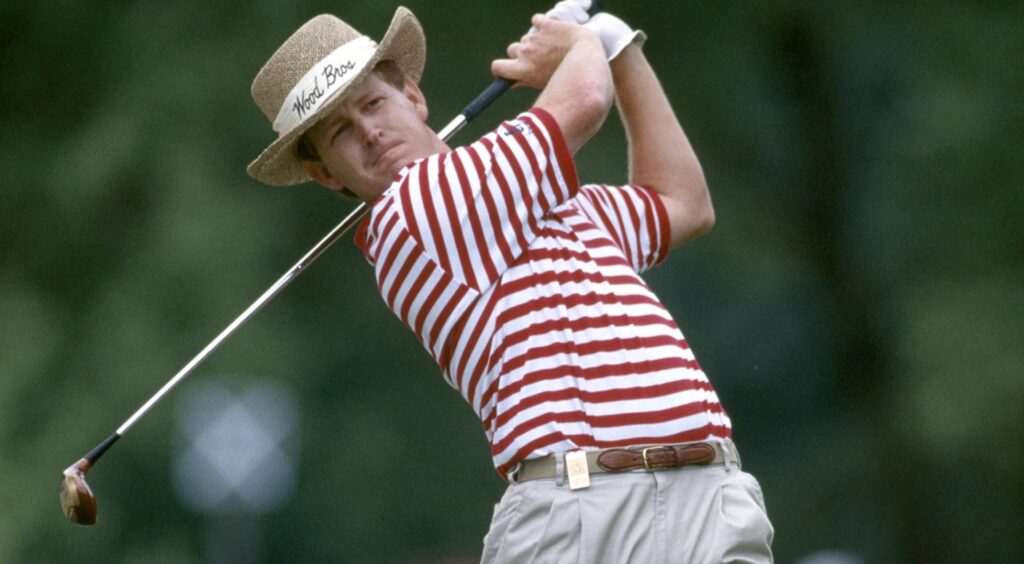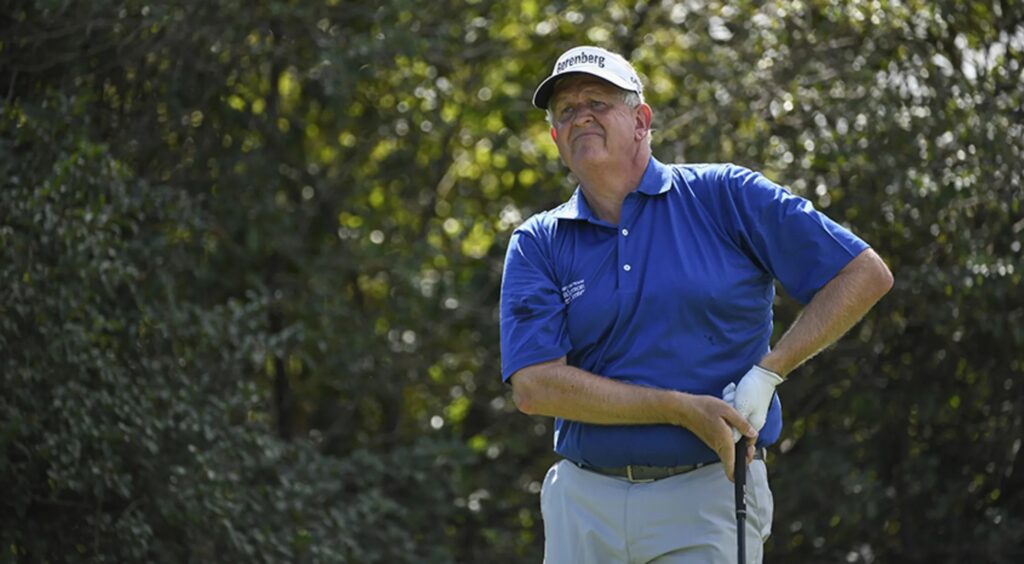
Number 10: 1990 PGA Championship—Freddie Couples
Freddie entered the final round at Shoal Creek two shots off the lead held by Wayne Grady. After playing flawless golf through the first twelve holes, including 4 birdies, he found himself leading by a shot with five holes to play. While Freddie has never been known for his putting, what followed was particularly painful for so many of us who love to watch him swing a golf club—bogies on 4 of his last 5 holes, including 3 missed par putts from inside 5 feet to lose by 3. Of course, if Freddie could putt, who knows how many more Tour wins and major championships he would have won. Still, this one was particularly tough…
Number 9: 2009 Open Championship—Tom Watson
When Tom Watson, at 59 years old, teed it up for the 2009 Open Championship at Turnberry, he had already been a member of the World Golf Hall of Fame for more than a decade with 9 Major Championships and 39 PGA Tour wins. His last Tour win had come at Colonial in 1998, and his 5th and final Open Championship victory had come more than a quarter century before at Royal Birkdale in 1983.
Watson was playing solid golf on the Champions Tour in ’09 with 7 Top 10’s in the 12 events he played, including a 4th place finish at the Senior PGA in May, where he closed with a final round 66. The notion that a man of near 60 could win The Open Championship against players of half his age, however, was simply out of the question.
Yet there he was, leading The Open as he stepped to the tee on the 18th hole on Sunday. Watson had fired rounds of 65, 70 and 71 to begin the day as the 54-hole leader by a shot, and he fought tooth and nail to maintain that lead on Sunday, including a brilliant birdie at the 17th hole to reach -3 and the outright lead over Stewart Cink who finished at -2 after making birdie on 18.
Watson hit a perfect drive to the center of the fairway on 18, and flushed his 8-iron approach directly at the stick—but he hit it so well that it carried too far and trickled over the back of the green leaving an extremely difficult downhill putt from against the collar. When Tom was unable to get up and down for par, he and Cink were headed to a 4-hole playoff.
It was clear that Tom had given everything he had through 72 holes, and there was nothing left in the tank for the playoff against a 36-year-old Cink. Stewart played brilliantly, with 2 birdies and 2 pars on the playoff holes, and claimed the Claret Jug as Champion Golfer for 2009.
Had Watson been able to make par at 18 on Sunday, it would have been a victory of epic proportion—but his play at the ’09 Open will be remembered as one of the great performances in the history of golf. And one of the toughest losses as well.

Number 8: 1966 U.S. Open—Arnold Palmer
As the 1966 U.S. Open at the Olympic Club got under way; Arnold Palmer had already achieved legendary status with 47 PGA Tour wins, including 7 Major Championships. When Arnie began the final round with a 3 shot lead over Billy Casper (and 4 shots ahead of Jack), it seemed a sure thing that he would raise the trophy for his 8th major at the end of the day. And when Palmer came out of the chute with birdies on the first two holes and a front nine 32 to open up a 7-shot lead over Casper, it appeared to be all but over.
Even when Arnie made bogey on 10 and his lead dipped to 6, there was still no cause for concern, because he came back with a par at 11 and a birdie on 12 to retain his commanding lead. The wheels began to wobble a bit on 13 with another bogey, but after making par on 14 he still held a 5 shot lead with only 4 holes to play—so what could possibly happen?
Nothing is a sure thing in golf, particularly major championship golf—and even the greats of the game can succumb to the suffocating pressure of closing at a U.S. Open. Arnie made bogey on 3 of the 4 final holes, while Casper birdied 15 and 16, and suddenly what seemed an insurmountable lead was completely erased as Palmer and Casper each finished at -2, forcing an 18-hole playoff on Monday.
Casper defeated Palmer in the playoff with a brilliant 69, capping off one of the greatest comebacks in major championship history. It was also the most catastrophic loss of Arnie’s illustrious career.
Number 7: 2006 U.S. Open—Phil Mickelson
Phil won the 2005 PGA and the 2006 Masters, so he was going for 3 majors in a row when play began at Winged Foot for the 2006 U.S. Open Championship. And with a T4 at The Memorial in early June and a Top 20 at the Barclays the previous week, his game was firing on all cylinders to finally take home that illusive U.S. Open crown (he finished runner up in 1999, 2002 and 2004).
Lefty visited Winged Foot weeks in advance, spending many hours practicing and analyzing the course to give himself the best opportunity to win. And it seemed that the time had been well spent as Phil held a share of the lead with Kenneth Ferrie at +2 going into the final round on Sunday, a shot ahead of Geoff Ogilvy. While Winged Foot bared its teeth through the first three rounds, on Sunday the fangs came out and par was proving to be a titanic struggle.
Mickelson fought his driver throughout the round, hitting only 2 of 14 fairways, but he clawed and scrambled to stay in the hunt, and after making birdie at 11, he found himself in the lead at +3, a shot ahead of Ogilvy and Colin Montgomerie. And when Phil reached the 18th tee, he was still holding the lead by a shot, needing only a par to raise the U.S. Open trophy at last. He decided to go to the well one more time with the diver, and again it failed him as he blocked his tee shot well left into the trees. Rather than play the safe shot under the trees to the fairway short of the green and trust his short game to get up and down for par, or at worst make bogey for a playoff, Phil (being Phil) opted for a high risk shot to the green over the trees. The shot caught a tree branch and came almost straight down, leading to a double bogey and another runner-up finish for Mickelson at the U.S. Open.

Number 6: 2003 Masters—Jeff Maggert
Jeff Maggert had a solid career on the PGA Tour, winning 3 times, but he never notched a major victory. At the 2003 Masters, Jeff began the final round at -5, holding a 2-shot lead over Mike Weir. In the previous 11 years, Jeff had recorded 11 Top 10 finishes at major championships, so being in contention on Sunday at a major was not new to him, but at 39 years old the clock was ticking.
Coming off a brilliant 66 in the 3rd round, it looked as though Maggert was finally going to break through for his first major win. He got off to a good start with par at the first two holes, but disaster struck at number 3. His tee ball found a fairway bunker and his second shot caught the lip, bounced straight back to hit him in the chest for a 2 stoke penalty, leading to a triple bogey. Suddenly Jeff found himself 2 shots behind Weir, who had made birdie at the second hole.
Maggert fought his way back with birdies at the 5th and 10th holes to get back to -4, 1 shot behind Weir and within 2 of Len Mattiace, who had taken the lead at -6 —but an even bigger disaster was waiting at the famous par 3 12th. His tee shot once again found the sand, this time behind the green, and when he caught his bunker shot a touch thin it rolled through the green and into the water—this time leading to a quadruple bogey 7, ending his hopes for a green jacket.
Jeff played 16 holes at 4 under par and 2 holes at 7 over. Had he avoided two bunkers and made par at 3 and 12, he would have finished at -9, 2 shots ahead of Weir and Mattiace, who both finished at -7 (Weir went on to defeat Mattiace in a playoff).
Maggert ended the day in a tie for 5th, his 12th Top 10 finish at a major—but this one was painful without a doubt.
Number 5: 2006 U.S. Open—Colin Montgomerie
Colin Montgomerie is considered to be one of the greatest European players of all time with 31 wins on the DP World Tour, and a near flawless record at the Ryder Cup—but the major championships always eluded him. Monty had a great many opportunities, losing in a playoff to Ernie Els at the 1994 U.S. Open and again in a playoff with Steve Elkington at the 1995 PGA Championship. He also suffered a tough loss to Els at the 1997 U.S. Open. The 2006 U.S. Open at Winged Foot, however, was no doubt the hardest loss of all.
Monty played solidly throughout the week, and after dropping a 75-foot putt for birdie on seventeen in the final round on Sunday, he was tied with Mickelson for the lead at +4 going to the last hole. With a perfect tee shot at 18, Monty was left with a 170-yard approach from the right side of the fairway. After much deliberation, Montgomerie pulled a 7 iron and caught it heavy, leaving a difficult chip from the rough short of the green. He then caught too much ball, and his chip scooted past the pin to the back of the green, leaving a treacherous downhill putt for Par—where it took 3 more to finally go down for a double bogey.
The double left Monty at +6, a shot behind Ogilvy’s winning score of +5, and Montgomerie had once again come up just short of winning a major championship.

Number 4: 2011 Masters—Rory McIlroy
A 21-year-old Rory McIlroy looked unstoppable through the first three rounds of the 2011 Masters Championship as he dominated the field with rounds of 65, 69 and 70 for a 12 under par total and a 4-shot lead going into Sunday.
While Rory looked a bit shaky on the front-nine with a pair of bogeys, he was still in the lead by a shot going to the back. But then the wheels came off completely with a triple bogey 8 at the 10th hole, followed by a bogey at 11 and a double at 12 in route to a back nine 43 and final round 80—dropping him all the way down to a tie for 15th.
Although it was a devastating loss, Rory would come back to win the U.S. Open a few months later, win the PGA Championship the following year and add two more majors in 2014 (The Open Championship and another PGA).
At the time it seemed inevitable that McIlroy would one day don a green jacket, but thus far the Masters is the only major championship that has eluded him.
Number 3: 1996 Masters—Greg Norman
Greg Norman was a dominating force in golf throughout the 1980’s and 1990’s, racking up twenty wins on the PGA Tour and 18 more on the DP World tour. Finishing at major championships, however, would become Norman’s Achilles heel. He suffered difficult losses at the Masters in ‘86 and ‘87, tough defeats at the U.S. Open in ‘84, ‘86, and ‘95, and a particularly painful loss at the Open Championship in 1989.
But his collapse at the 1996 Masters was by far the worst. After a brilliant opening round 63, Norman was cruising at -13 and a 6-shot lead over Nick Faldo going into the final round on Sunday. Things began to go wrong immediately, however, with a bogey at the first hole—and it only went down-hill from there as Greg carded 4 more bogeys and 2 doubles in route to a 78, finishing 5 shots back of Faldo who played a flawless final round of 67.
The 11-shot swing between Norman and Faldo on Sunday at the ’96 Masters was truly astounding, and certainly the hardest loss of Greg’s distinguished career.

Number 2: 2016 Masters—Jordan Speith
On the twentieth anniversary of Greg Norman’s famous collapse at Augusta, it seemed ironic that Jordan Spieth should suffer a similar fate. Jordan was dominating the PGA Tour, having won both the Masters and U.S. Open with a runner-up at the PGA and a T4 at the Open Championship the previous year.
While Spieth held a slim 1 shot lead over Smilie Kauffman at the start of the final round on Sunday, 5 birdies on the front with only 1 bogey brought him to 7 under par and a seemingly insurmountable 5 shot lead over Danny Willett heading to the back nine. His lead, however, began to shrink with bogeys at 10 and 11—and disappeared completely when Jordan put two balls in the water on the 12th hole for a triple bogey 6.
Suddenly Jordan found himself a shot behind Willett, and although he tried to come back with birdies at 13 and 15, the disastrous 3 hole stretch from 10-12 where he was 5 over par was too much to overcome, and Jordan finished runner-up, 3 shots behind Willet.
While the 2016 Masters was a tough loss for Jordan, he came back to win the 2017 Open Championship at Royal Birkdale.
Number 1: 1999 Open Championship—Jean Van de Velde
Jean Van de Velde was not a household name when he teed it up at Carnoustie for the 1999 Open Championship, but he certainly became famous after the final hole on Sunday.
Carnoustie Golf Links, generally recognized as the most difficult of the courses in the Open Championship rotation, was playing particularly tough as no one in the field could come close to breaking par. Van de Velde, an unheralded French pro, was the only player in the field who was able to tame the course at even par, and he held a 5 shot lead over Justin Leonard and Craig Parry going to the final round.
Carnoustie began to yield a bit on Sunday, and Paul Lawrie was able to post an outstanding 4 under round of 67, and get to +6 for the tournament. Justin Leonard also played extremely well, posting a 72 to also finish at +6. In the meantime, Van de Velde was struggling, but fought his heart out to hold a 3 shot lead going to the last, needing only a double bogey or better to claim the Claret Jug as the 1999 Champion Golfer of the year.
Curiously, Van de Velde opted to go with driver from the tee at the 18th hole, and although he sprayed it to the right, somehow avoided trouble and was left with a lengthy approach from the rough. Even more curiously, Jean decided to go for the green, rather than lay-up short where he could pitch on and guarantee a bogey (or no worse than double) and win the championship.
Van de Velde pushed his approach and the ball struck the stands to the right of the green, bounding some 30 yards backward into knee high grass short of the green. He couldn’t make a clean strike from the difficult lie, and his pitch found the water short of the green. After taking a drop, he caught his chip shot heavy and came up short in a bunker—so incredibly he would now need to get up and down from the sand just to get into a playoff with triple bogey 7.
To his credit, Jean holed a lengthy putt for triple and joined the playoff with Lawrie and Leonard, but went down to defeat as Lawrie matched par in the 4-hole playoff and claimed the championship.
But it has to be the toughest loss ever at a major championship…